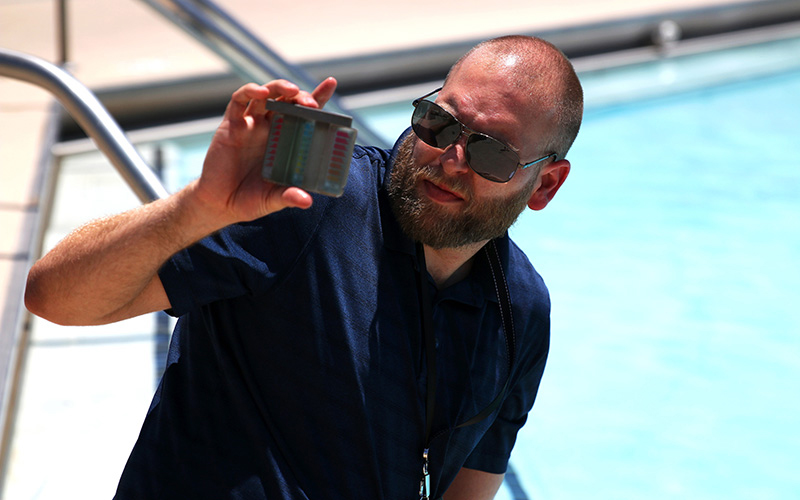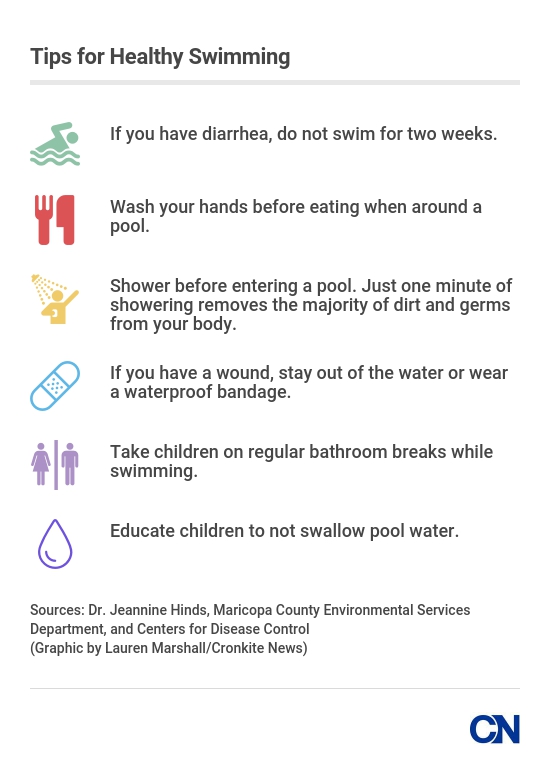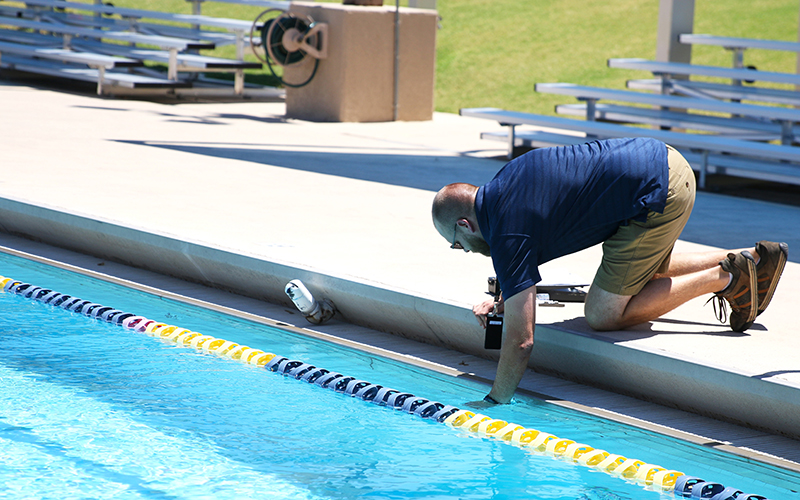SCOTTSDALE – As pool use surges during the summer, swimmers’ risk of contracting a waterborne illness rises.
Last year an outbreak of a parasite, crypto, sickened 549 people in Arizona, a major jump from previous years, according to local government officials.
Department of Health Services officials said this jump was caused by the contagious nature of the disease coupled with the fact that the parasite can spread in a pool with normal chemical levels.
Zach Crader, an inspector for the Maricopa County Environmental Services Department, inspects public pools run by cities, hotels and apartments to help protect swimmers from injuries, drownings and recreational water illnesses.
“Crypto is one of the most highly susceptible” recreational water illnesses, Crader said. “It doesn’t take very much to get someone sick.”
The parasite is usually spread when infants and toddlers or someone with diarrhea infects a pool and someone swallows the water. The majority of Arizonans infected with crypto in 2016 contracted the parasite after visiting a public pool, such as those run by cities, or a semi-public pool, such as those at apartments, hotels and gyms, according to state health department data.

Maricopa County Environmental Services Department Inspector Zach Crader measures chemical levels at public pools, hotels and apartments across the Valley. (Lauren Marshall/Cronkite News).
Dr. Jeannine Hinds, a family physician with Honor Health, said that infants and toddlers are most susceptible to contracting crypto.
It causes diarrhea, vomiting, fever and stomach cramps. Hinds said while symptoms are unpleasant, most people don’t need medical treatment. Rest and plenty of fluids will lead to recovery.
“There are medications for anti-parasitics, but this infections doesn’t usually require it,” Hinds said. “If we find that the diarrhea is lasting longer than we’d like to, we may do some more testing and may consider prescribing medications, but other than that it’s easily treated.”
Hind said healthy swimming, including not swallowing water, not swimming if you’re ill and washing your hands after you swim, is the most important step in preventing crypto.
Pool inspections check equipment and chlorine, among other things, but Hinds said there’s no test to detect the crypto parasite.

Last year 86 public aquatic places were affected by crypto, 74 of which were in Maricopa County, according to the CDC.
Public pools are not the only facilities that can be affected by recreational water illnesses. The county also inspects semi-public pools, such as pools at hotels, apartment complexes and gyms, to make sure they are safe for swimmers.
Crader said the majority of critical violations occur in semi-public pools, such as hotels and apartments.
“I’ve gone to areas that are lower income and I’ve been to areas that are higher income, and I close down pools in both areas,” Crader said. “Higher income does not necessarily mean that the pool is in great shape.”
Inspectors check chemical levels, ensure pumps and equipment are not damaged and make sure gates and enclosures are not broken so children can’t wander into pools. Crader and Hinds both said it’s important to make sure all pools are well maintained because neglected pools can spread disease.
Crader said recreational water illnesses increase in the summer not just because more people are using pools, but also because UV rays break down chlorine. In the peak of summer, chlorine is low or missing from pools.
That’s troublesome because crypto is chlorine resistant, he said. If someone using your pool gets crypto, Crader said to follow CDC recommendations and increase chlorine levels in your pool.
Crypto is “very difficult to get rid of,” Crader said. “It’s chlorine resistant.”
When a pool is contaminated or has a violation that endangers swimmers, pool inspectors have to order the pool closed.
A closure could affect pool users like 61-year-old William P. Levy who swims for four hours, six days a week. Levy said that he had been “obese” and used swimming as a way to lose weight.
Levey said that he loves city pools and prefers using them to other pools.
“All of the Scottsdale pools are well maintained,” Levy said.

Zach Crader, an inspector with Maricopa County Environmental Services Department, examines a city pool in Scottsdale. The pool inspection status was approved. (Lauren Marshall/Cronkite News).
Benjamin Palmer, a spokesman for the state health department, said crypto infections are hard to predict.
“It’s very year to year,” Palmer said. “We never quite know.”
Palmer did say that 2016 was “an aberration,” but the county works hard to make sure that people are properly educated on how to practice safe swimming.
“It just takes one pool and one person, and that’s how it spreads,” Palmer said.